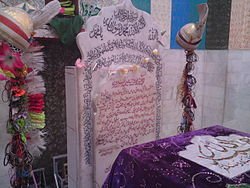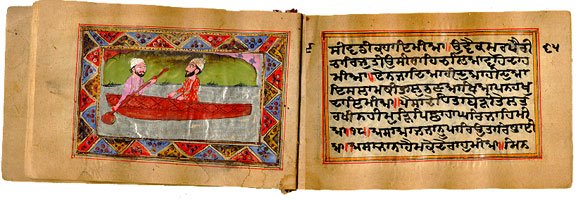Heer Ranjha (Punjabi: ਹੀਰ ਰਾਂਝਾ, ہیر رانجھا, hīr rānjhā) is one of several popular tragic romances of Punjab. The others are Mirza Sahiba and Sohni Mahiwal. There are several poetic narrations of the story, the most famous being 'Heer' by Waris Shah written in 1766. It tells the story of the love of Heer and her lover Ranjha.[1]

Heer Ranjha was written by Waris Shah. Some historians say that the story was the original work of Shah, written after he had fallen in love with a girl named Bhag Bhari.[2] Others say that Heer and Ranjha were real personalities who lived under the Lodi dynasty and that Waris Shah later utilised these personalities for his story. Shah states that the story has a deeper meaning, referring to the unrelenting quest that man has towards God.[3]

Heer is an extremely beautiful woman, born into a wealthy family of the [Sial tribe {sial is the place where heer belongs (Sial sharif) }] in Jhang and her caste is Kharal or Kharral [Jatt]. which is now Punjab, Pakistan. Ranjha (whose first name is Dheedo; Ranjha is the surname,his caste is Ranjha[Jatt]), a Jat of the Ranjha tribe, is the youngest of four brothers and lives in the village of Takht Hazara, Pakistan by the river Chenab. Being his father's favorite son, unlike his brothers who had to toil in the lands, he led a life of ease, playing the flute ('Wanjhli'/'Bansuri'). After a quarrel with his brothers over land, Ranjha leaves home. In Waris Shah's version of the epic, it is said that Ranjha left his home because his brothers' wives refused to give him food. Eventually he arrives in Heer's village and falls in love with her. Heer's father offers Ranjha a job herding his cattle. Heer becomes mesmerised by the way Ranjha plays his flute and eventually falls in love with him. They meet each other secretly for many years until they are caught by Heer's jealous uncle, Kaido, and her parents Chuchak and Malki. Heer is forced by her family and the local priest or 'Maulvi' to marry another man named Saida Khera.
Ranjha is heartbroken. He wanders the countryside alone, until eventually he meets a Shaiva Jogi (ascetic). After meeting Gorakhnath, the founder of the "Kanphata" (pierced ear) sect of jogis at Tilla Jogian (the 'Hill of Ascetics', located 50 miles north of the historic town of Bhera, Sargodha District, Punjab), Ranjha becomes a jogi himself, piercing his ears and renouncing the material world. While reciting the name of the Lord, he wanders all over Punjab, eventually finding the village where Heer now lives.
The two return to Heer's village, where Heer's parents agree to their marriage - though some versions of the story state that the parent's agreement is only a deception. On the wedding day, Kaido poisons her food so that the wedding will not take place, in order to punish the girl for her behaviour. Hearing this news, Ranjha rushes to aid Heer, but is too late, as she has already eaten the poison and has died. Brokenhearted once again, Ranjha eats the remaining poisoned Laddu (sweet) which Heer has eaten and dies by her side.
Heer and Ranjha are buried in Heer's hometown, Jhang. Love-smitten couples and others often pay visits to their mausoleum.[5]
Because its plot involves a romance opposed by family members and ends with the two lovers dying, the story is often compared to the Shakespeare play Romeo and Juliet.[6][7]

Hi! I am a robot. I just upvoted you! I found similar content that readers might be interested in:
https://en.wikipedia.org/wiki/Heer_Ranjha